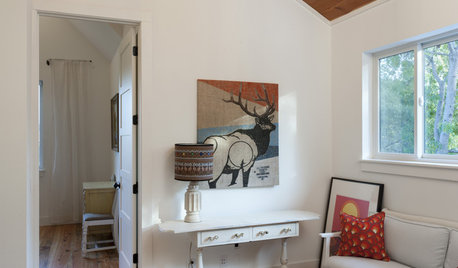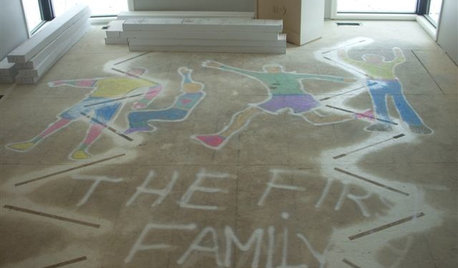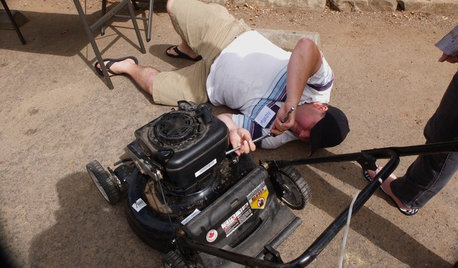British words or expressions found while reading....cont'd
yoyobon_gw
last year
Featured Answer
Sort by:Oldest
Comments (110)
vee_new
last yearannpanagain
last yearRelated Discussions
Regional or NYC expression?
Comments (33)I don't think it's a new trend lukki (at least based on my hearing it in movies, going back quite a ways). It's not common, tho. But then when Sonja & occasionally one of the others started saying it a lot, that's what made me start to wonder again. I need to reread terriks link, looks rather fascinating but definitely not a skim over type article. Thanks! :) Jen, interesting about the British. (I often wonder if they view us as having butchered the King's English. ;) Look how much their language has changed just since the Tudor/Elizabethan eras. I saw a special on History Channel once, about how language evolved in Britain tracing it as far back in recorded history as they could. Honestly what they started out with isn't even close to what's used today. I get so engrossed in all this!...See MoreThe most recent words you had to look up
Comments (91)My wife asked me what "refulgent" meant - she'd found it in a magazine article. I was able to tell her that it turns up in a song in the Mikado, but I didn't know what it meant. So we looked it up - it means "shining, brilliant or radiant" - and it's marked in my dictionary as "Literary". I've just looked up the G&S - I was actually wrong! This is the song I was misremembering. The sun, whose rays are all ablaze With ever-living glory, Does not deny his majesty He scorns to tell a story! He don't exclaim, "I blush for shame, So kindly be indulgent." But, fierce and bold, In fiery gold, He glories all effulgent! And what does "effulgent" mean? Radiant, brilliant... I have to say that in my opinion, both effulgent and refulgent sound downright unpleasant - it's a surprise to me that they don't mean as they sound. Is there a word for the opposite of onomatopoeia?...See MoreBritishisms continued, again
Comments (88)Ginny, we had a discussion about frocks somewhere around RP not long ago. I got the impression no US female has worn one for many years but the word is still around over here although it has come to be used as in a 'party frock' event or maybe a summery picnic-by-the-river/watching a game of polo with an eligible Royal. At the other extreme 'frocks' are worn by the transvestite community. The artist Grayson Perry collected his Turner Prize wearing a natty little number . . . a path down which I shall no further tread. Re plus-fours my father wore them as a young man about town/golf course, years before he married. We still have the long socks/stockings that he wore with them. They were kept for Christmas Eve and left at the end of our beds for 'Father Christmas' (as we in the UK call Santa Claus). They were inherited by our children, pity Dad didn't have three legs. Still holding up well since c1930 . . . could the same be said of modern materials?...See MoreAny expressions that irk you?
Comments (192)I was watching a news program the other day, when the talking head clearly said, "he has a tough road to hoe." I think hoeing any road would be pretty darned tough. The expression is clearly supposed to be "a tough row to hoe," yet I constantly hear people say it as road....See Moreyoyobon_gw
last yearlast modified: last yearvee_new
last yearyoyobon_gw
last yearwoodnymph2_gw
last yearvee_new
last yearlast modified: last yearyoyobon_gw
last yearlast modified: last yearvee_new
last yearwoodnymph2_gw
last yearlast modified: last yearyoyobon_gw
last yearCarolyn Newlen
last yearyoyobon_gw
last yearannpanagain
last yearyoyobon_gw
last yearlast modified: last yearannpanagain
last yearyoyobon_gw
last yearKath
last yearvee_new
last yearginny12
last yearannpanagain
last yearginny12
last yearannpanagain
last yearvee_new
last yearlast modified: last yearginny12
last yearyoyobon_gw
last yearginny12
last yearannpanagain
last yearginny12
last yearCarolyn Newlen
last yearvee_new
last yearyoyobon_gw
last yearannpanagain
last yearyoyobon_gw
last yearvee_new
12 months agoannpanagain
12 months agoginny12
6 months agoyoyobon_gw
6 months agonetla
6 months agolast modified: 6 months agovee_new
6 months agolast modified: 6 months agoginny12
6 months agoannpanagain
6 months agoginny12
6 months agomsmeow
6 months agoginny12
6 months agovee_new
6 months agoyoyobon_gw
6 months agoRosefolly
5 months agolast modified: 5 months agoginny12
5 months agolast modified: 5 months agoyoyobon_gw
5 months agolast modified: 5 months ago
Related Stories

MOST POPULARThree Magic Words for a Clean Home and a Better Life
Not a natural tidying and organizing whiz? Take hope in one short phrase that can change your life forever
Full Story
HOUZZ CALLEver Found or Left a Note in the Wall the Way This Couple Did?
The remodeling couple whose note from previous homeowners went viral tell us about their fun find. What’s yours?
Full Story
DECORATING GUIDESSpell It Out: Words of Inspiration for Your House
A favorite quote can enhance a room the way an inspiring idea engages your mind. Here’s how to add word power to your interiors
Full Story
DECORATING STYLESWorld of Design: 11 Secrets of British Eccentric Style
Playfulness, humor and imperfection are some of the elements common to this unconventional way of decorating
Full Story
REMODELING GUIDESHow to Read a Floor Plan
If a floor plan's myriad lines and arcs have you seeing spots, this easy-to-understand guide is right up your alley
Full Story
MOST POPULARA Few Words on the Power of Simplicity
An architect considers a pared-down approach to modern home design
Full Story
KITCHEN APPLIANCESConsidering a New Kitchen Gadget? Read This First
Save money, time and space by learning to separate the helpers from the hassles
Full Story
LIFEWhat I Learned While Cleaning Out My Junk Drawers
A homeowner finds some surprises on her journey to junk-free bliss
Full Story
HOMES AROUND THE WORLDWorld of Design: 11 Book Lovers and Where They Like to Read
Bibliophiles across the globe reveal their top books and favorite reading spots, from a 2-story library to an artfully curated book nook
Full Story
EVENTSDon't Throw Away Another Household Item Before Reading This
Repair Cafe events around the world enlist savvy volunteers to fix broken lamps, bicycles, electronics, small appliances, clothing and more
Full Story



vee_new